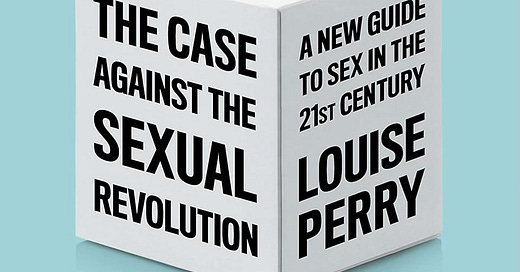Louise Perry's "The Case Against the Sexual Revolution: A New Guide to Sex in the 21st Century"
(Polity Press, Cambridge: 2022)
They say “sex sells” and if so, this book should have been a best-seller on both sides of the Atlantic (the author is British). It is literally chocked-full of it, including descriptions Hugh Hefner’s orgies at the Playboy Mansion, porn movies like “Deep Throat,” and pedophile gangs.
However, when I looked at Amazon’s ranking today, The Case Against Sexual Revolution was number 918,022. Although the book is a couple of years old, it deserves far better than that. In fact, in my opinion it provides a definitive rebuttal to feminist arguments against motherhood and the family, designed for thinking men and women.
Basically, Perry’s contention is that the sexual revolution made possible by the invention of the Pill and legalization of abortion converted women from high-status mothers and homemakers—you might call them “Queen Bees”—into careerist drones (you might call them “Worker Bees”).
Sex replaced love, hook-ups replaced romance, workplaces replaced homes, and in the end loneliness, frustration, and resentment replaced the satisfactions of domestic life.
Worse, the constant emphasis on sex has led to twin problems of “incels” who aren’t ready for the carnival of copulation demanded of women today, a rise in lesbianism which might be seen as a return to virtues like chastity, or on the other hand, “hook-up” culture and all that it entails—rape, violence, child molestation, suicide and so forth…things previously stigmatized as “vices.”
Perry’s argument is that feminism, far from liberating women, has enslaved them as either whores or spinsters. The previously available alternative lifestyle of domesticity has been rendered available only to a lucky few very wealthy people who can find a mate with a single income sufficient to support a family—something that the vast majority of people enjoyed prior to feminism’s corrosion of child-centeredness.
Instead of love and charity, selfish hedonism has been promoted as the ideal. The results have been a disaster for women, Perry argues. And her evidence isn’t all statistical. The New Statesman journalist has worked in a rape crisis center and seen firsthand the damage that the sexual revolution has wrought—psychologically, physically and economically. While the benefits of women in the workforce have been highlighted by the media for decades, the costs have been largely suppressed. Perry’s manifesto aims to change that.
One chapter is more chilling than the next, each title a challenge to a current “smelly little orthodoxy.” Here’s a list:
Sex Must Be Taken Seriously (This is an argument for dignity)
Men and Women are Different (This is an argument for biology)
Some Desires are Bad (This is an argument for virtue)
Loveless Sex is Not Empowering (This is an argument for love)
Consent is Not Enough (This is an argument for chastity)
Violence is Not Love (This is an argument for tenderness)
People are Not Products (This is an argument for fidelity)
Marriage is Good (This is an argument for marriage)
Conclusion: Listen to Your Mother (This one is self-evident)
Needless to say, none of this would have been controversial in 1950. But today it is the height of blasphemy to argue any of these theses, much less all eight of them.
But like J.K Rowling’s opposition to transgenderism, what was once common-sense has become increasingly uncommon. So it was refreshing and inspiring to read Louise Perry’s superbly crafted arguments, which must have required great courage to put into type in today’s Britain.
Louise Perry's "The Case Against the Sexual Revolution: A New Guide to Sex in the 21st Century"should be added to any serious library on feminism. It deserves the widest possible debate and discussion.
Those interested in learning more can check out her counter-revolutionary podcast, “Maiden, Mother, Matriarch.”





This book looks well worth reading. It's so sad for young women to be morally bludgeoned into corporate cubicles where they will invest all their time and energy to claw their way into a coveted corner office. And for what? So they can join the legions of angry middle-aged solitary women whose careers aren't what they were cracked up to be, and who missed out on family life. We should add one more thing to Louise Perry's catalogue of 'liberated' women's self-inflicted misery: Two-income households earn about the same as single-earner households did in the 1950s. Nor is that an accident. Corporate employers understood very well that setting the sexes (men and women, that is) against each other, forcing them to compete with each other, would depress wages and salaries. Double the work force while keeping the number of jobs stagnant -- do the math. Of course the addition of women to the away-from-home work force, along with other parts of the globalist program such as 'open-borders', depresses incomes. But math, as Charlie Summers got into trouble for admitting, wasn't generally women's strong suit (with significant individual exceptions, however). So here we are, with a large and growing cohort of sexually and professionally frustrated single women, and an exploding market for anti-depressants. May Louise Perry's book will encourage some self-reflection among these unfortunates, leading toward recovery of common-sense and happiness.